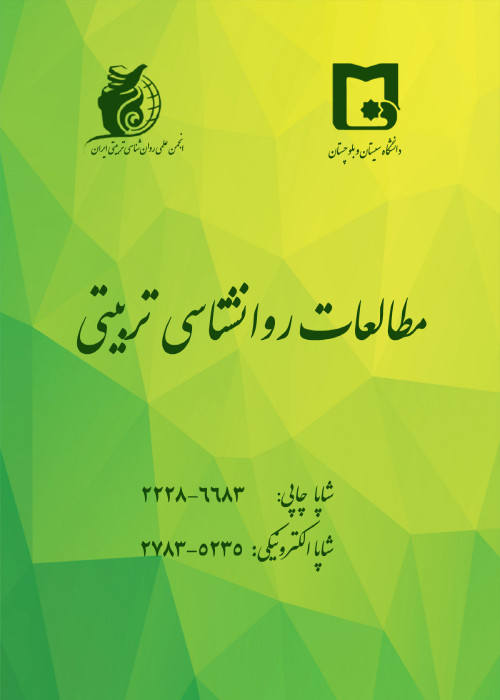The role of academic optimism, meta cognition belief, cognitive emotion regulation in predicting academic self-handicapping
Author(s):
Article Type:
Research/Original Article (دارای رتبه معتبر)
Abstract:
Background and
Findings: The findings indicated that there was a negative and significant relationship between self-incapacitation with academic optimism, acceptance, positive attitude, focus on thinking, positive beliefs, cognitive self-awareness, and self-accountability subcultures, reconsideration of the program There is a positive, meaningful relationship between disposition, disaster, cognitive conflict, uncontrollability and the risk of thoughts and the need for control of thoughts. also, the results of multiple regression analysis indicated that academic optimism, positive meta-cognitive beliefs and consistent strategies for cognitive emotion regulation negatively and negative meta-cognitive beliefs and incompatible strategies of cognitive emotion regulation positively predict self-adaptive learning. The findings also showed that predictive variables generally account for 50.1% of the variance of academic self-incapacitation.
Discussion and
Purpose
Students failure or fear of failure in academic situations, a set of strategies to employ. Has the ability to be seen as victims of circumstance and not the victims. That's why they are experiencing academic self-handicapping. Many studies have studied the factors affecting self-handicapping and have identified many factors. The aim of this study was to investigate the role of academic optimism, metacognition belief, and cognitive emotion regulation in predicting academic self-handicapping Lorestan University students in the academic year 2013-14.Methods
The community of this research was comprised of all students of Lorestan University. Sample of 350 undergraduate students (200 women and 150 men) who were selected by simple random sampling (sample size was estimated according to Morgan table). Data from the questionnaires cognitive-emotional adjustment Garnfsky and other (2001), academic self-handicapping Miguel (2000), academic optimism Shirer and Carver (1985), metacognitive beliefs Wells and Cater-Haiten (2004) used. This study was descriptive correlational and data were analyzed using simple correlation coefficient and multiple regression simultaneously.Findings: The findings indicated that there was a negative and significant relationship between self-incapacitation with academic optimism, acceptance, positive attitude, focus on thinking, positive beliefs, cognitive self-awareness, and self-accountability subcultures, reconsideration of the program There is a positive, meaningful relationship between disposition, disaster, cognitive conflict, uncontrollability and the risk of thoughts and the need for control of thoughts. also, the results of multiple regression analysis indicated that academic optimism, positive meta-cognitive beliefs and consistent strategies for cognitive emotion regulation negatively and negative meta-cognitive beliefs and incompatible strategies of cognitive emotion regulation positively predict self-adaptive learning. The findings also showed that predictive variables generally account for 50.1% of the variance of academic self-incapacitation.
Discussion and
Conclusion
The results suggest the importance of academic optimism, metacognition, cognitive emotion regulation in predicting academic self-handicapping. So if using training methods optimism to the academic, cognitive emotion regulation and increased use of positive beliefs can be self-handicapping level education to significantly bring down Keywords:
Language:
Persian
Published:
Journal of Educational Psychology Studies, Volume:15 Issue: 30, 2018
Pages:
207 to 240
magiran.com/p1846265
دانلود و مطالعه متن این مقاله با یکی از روشهای زیر امکان پذیر است:
اشتراک شخصی
با عضویت و پرداخت آنلاین حق اشتراک یکساله به مبلغ 1,390,000ريال میتوانید 70 عنوان مطلب دانلود کنید!
اشتراک سازمانی
به کتابخانه دانشگاه یا محل کار خود پیشنهاد کنید تا اشتراک سازمانی این پایگاه را برای دسترسی نامحدود همه کاربران به متن مطالب تهیه نمایند!
توجه!
- حق عضویت دریافتی صرف حمایت از نشریات عضو و نگهداری، تکمیل و توسعه مگیران میشود.
- پرداخت حق اشتراک و دانلود مقالات اجازه بازنشر آن در سایر رسانههای چاپی و دیجیتال را به کاربر نمیدهد.
In order to view content subscription is required
Personal subscription
Subscribe magiran.com for 70 € euros via PayPal and download 70 articles during a year.
Organization subscription
Please contact us to subscribe your university or library for unlimited access!



